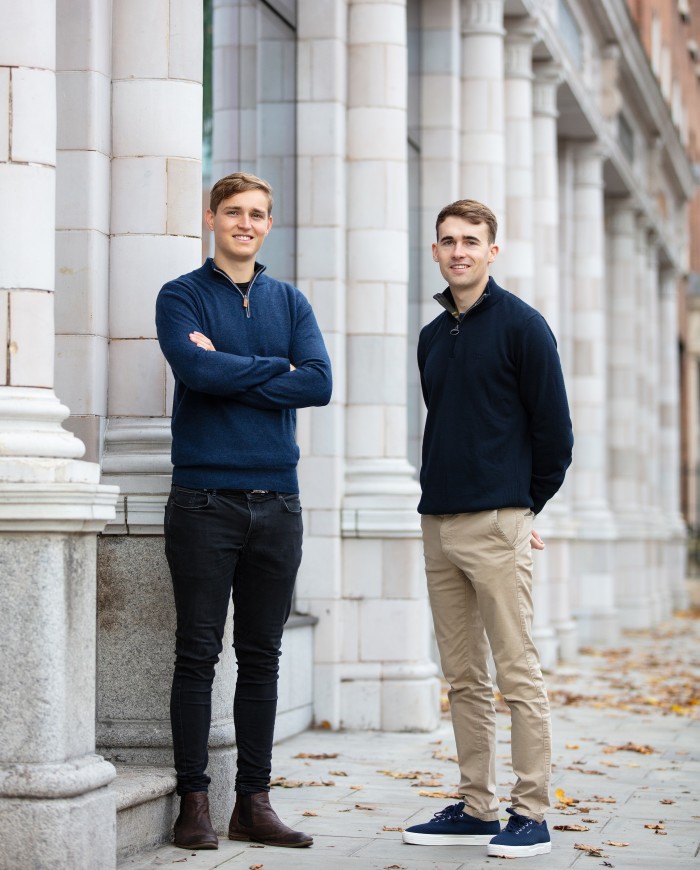Business students turn matchmaker to help pandemic-hit SMEs

Roula Khalaf, Editor of the FT, selects her favourite stories in this weekly newsletter.
Universities and business schools often foster friendships. Sometimes these relationships bear fruit for the benefit of others. Recent Trinity Business School graduates Paddy Ryder and Rob Muldowney saw such an opportunity during the pandemic.
Students and graduates, including the two friends at the Dublin school, watched internship prospects evaporate. Yet they had skills, particularly in technology, that small businesses needed as they struggled to pivot to digital platforms and delivery models that could shore up sales.
“Rob and I were both doing the global business course at Trinity and by virtue of it being a small course, we became friendly,” says Ryder, now studying a finance and accounting masters at Imperial College Business School in London. “At the end of the course, [job and internship] interviews were being cancelled or postponed because of Covid. We realised we weren’t alone and thought there might be an opportunity to mobilise fellow students.”
The friends decided to set up Covid Interns, a not-for-profit matchmaking platform that connects small businesses with volunteer students and graduates. In return, the students and graduates gain experience in fields such as digital marketing, financial planning, consulting, web development, public relations campaigns, content writing and social media management. While the pair were then undergraduates, the platform also connects postgraduate students with businesses.
A couple of weeks after launch, Covid Interns had signed up more than 100 volunteers and businesses, from small restaurant chains to local charities. To date, it has placed students from most Irish universities and business schools, including Trinity and University College Dublin, as well as more than a dozen in the UK, including the University of Cambridge, London School of Economics, the University of Edinburgh and Imperial College London. The platform has also been accepted on to an accelerator programme.
“Even after the pandemic I think there will still be demand for pro bono projects and work placements students can fit around their schedules,” says Muldowney, now a sales executive for US home health testing start-up LetsGetChecked. “We’re also going to transition it into a platform where there are paid opportunities too.”
Camille Zivré and Lucille Collet have been friends since meeting five years ago as first-year students at HEC Paris, bonding over late night pastry-baking while organising arts events on campus. “We were both looking for a way to help out in these difficult times and give students and graduates a chance to modestly contribute to finding solutions to some of the many problems presented by the crisis,” recalls Collet, who graduated last year with a masters in management.
“The idea of doing nothing was too frustrating when we were hearing medical staff, families, entrepreneurs and people from all backgrounds asking for help,” says Zivré, who graduated last year with an MBA and had volunteered earlier in the year as a mentor for Hack the Crisis, a hackathon initiative that started in Estonia.
Three weeks after coming up with the idea, the pair ran their own hackathon over the Easter weekend. Backed by HEC and fellow French higher-education institutes SciencesPo and Ecole Polytechnique, the event gathered 1,400 hackers and mentors, who developed 103 projects in 48 hours to support health professionals, governments, businesses and local communities. One of the winning six projects, Granny, addresses the challenge of communicating with relatives in care homes. Another, Midad, a smart mask and app using artificial intelligence to detect Covid infection, raised funding during the hackathon.
Zivré, now an investor for venture capital fund Inventure in Stockholm, says she and Collet were taken aback by people’s eagerness to help. “It made us raise our own standards,” she says. “We had to level up to their amazing energy.” Now, Zivré and Collet, who is pursuing a masters in applied economics, are mentoring the founders of similar hackathons elsewhere in France, Scandinavia and Africa.
Business schools across Europe tell similar stories of problem-solving students and graduates. London Business School MBA students Stacy Sawin and Vinay Muttineni created an LBS Covid-19 volunteer group to help communities in three London districts, focusing on community outreach, support for food banks and homeless shelters, projects to support small businesses, fundraising and the delivery of baked goods to hospitals. Another LBS group created Mask Share, a crowdsourcing platform co-founded by MiM student Jimmy Tahhan to connect donors with health service workers and hospitals in need of masks.
Masters in management students at ESMT Berlin have worked alongside social impact project ErnteErfolg — developed during a hackathon called #WirVsVirus — to help farmers find harvest workers to replace seasonal workers who had returned to Poland and the Czech Republic.
MBA students at Kent Business School in south-east England developed Ear for Business, a social enterprise to provide support and signposting to other help for small and start-up businesses, helping to tackle social isolation, particularly in rural areas.
For other students, lockdown presented opportunities to return home to help local businesses. Alberto Cessel, a final-year business management student at Newcastle University Business School in north-east England, co-founded a business that helps family-owned restaurants and food retailers in his home town of Siena, Italy, to continue trading by centralising order, payment and delivery processes on an online platform. Meanwhile, Mujtaba Shaikhani, an MSc entrepreneurship student at The Business School at City, University of London, returned to his family’s business in Dubai to develop walk-through sanitisation chambers that are used in government offices, supermarkets and hotels in the United Arab Emirates.
Latest coronavirus news

Follow FT's live coverage and analysis of the global pandemic and the rapidly evolving economic crisis here.
Comments